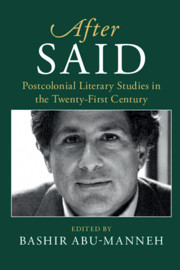26 results
Chapter 1 - Said’s Political Humanism
-
-
- Book:
- After Said
- Published online:
- 21 December 2018
- Print publication:
- 13 December 2018, pp 1-19
-
- Chapter
- Export citation
Contributors
-
- Book:
- After Said
- Published online:
- 21 December 2018
- Print publication:
- 13 December 2018, pp ix-x
-
- Chapter
- Export citation
Further Reading
-
- Book:
- After Said
- Published online:
- 21 December 2018
- Print publication:
- 13 December 2018, pp 210-213
-
- Chapter
- Export citation
Dedication
-
- Book:
- After Said
- Published online:
- 21 December 2018
- Print publication:
- 13 December 2018, pp v-vi
-
- Chapter
- Export citation
Copyright page
-
- Book:
- After Said
- Published online:
- 21 December 2018
- Print publication:
- 13 December 2018, pp iv-iv
-
- Chapter
- Export citation
Index
-
- Book:
- After Said
- Published online:
- 21 December 2018
- Print publication:
- 13 December 2018, pp 214-222
-
- Chapter
- Export citation
Acknowledgments
-
- Book:
- After Said
- Published online:
- 21 December 2018
- Print publication:
- 13 December 2018, pp xi-xii
-
- Chapter
- Export citation

After Said
- Postcolonial Literary Studies in the Twenty-First Century
-
- Published online:
- 21 December 2018
- Print publication:
- 13 December 2018
Contents
-
- Book:
- After Said
- Published online:
- 21 December 2018
- Print publication:
- 13 December 2018, pp vii-viii
-
- Chapter
- Export citation
Contents
-
- Book:
- The Palestinian Novel
- Published online:
- 05 April 2016
- Print publication:
- 26 April 2016, pp vii-vii
-
- Chapter
- Export citation
Chapter 4 - Sahar Khalifeh: radical questions and revolutionary feminism
-
- Book:
- The Palestinian Novel
- Published online:
- 05 April 2016
- Print publication:
- 26 April 2016, pp 116-135
-
- Chapter
- Export citation
Note on transliteration
-
- Book:
- The Palestinian Novel
- Published online:
- 05 April 2016
- Print publication:
- 26 April 2016, pp x-x
-
- Chapter
- Export citation
Chapter 5 - Tonalities of defeat and Palestinian modernism
-
- Book:
- The Palestinian Novel
- Published online:
- 05 April 2016
- Print publication:
- 26 April 2016, pp 136-161
-
- Chapter
- Export citation
Bibliography
-
- Book:
- The Palestinian Novel
- Published online:
- 05 April 2016
- Print publication:
- 26 April 2016, pp 207-225
-
- Chapter
- Export citation
Epilogue:remembrance after defeat –Gate of the Sun(1998)
-
- Book:
- The Palestinian Novel
- Published online:
- 05 April 2016
- Print publication:
- 26 April 2016, pp 162-168
-
- Chapter
- Export citation
Dedication
-
- Book:
- The Palestinian Novel
- Published online:
- 05 April 2016
- Print publication:
- 26 April 2016, pp v-v
-
- Chapter
- Export citation
Index
-
- Book:
- The Palestinian Novel
- Published online:
- 05 April 2016
- Print publication:
- 26 April 2016, pp 226-235
-
- Chapter
- Export citation
Chapter 3 - Emile Habiby: capture and cultural escape inThe Pessoptimist(1974)
-
- Book:
- The Palestinian Novel
- Published online:
- 05 April 2016
- Print publication:
- 26 April 2016, pp 96-115
-
- Chapter
- Export citation
Notes
-
- Book:
- The Palestinian Novel
- Published online:
- 05 April 2016
- Print publication:
- 26 April 2016, pp 169-206
-
- Chapter
- Export citation
Copyright page
-
- Book:
- The Palestinian Novel
- Published online:
- 05 April 2016
- Print publication:
- 26 April 2016, pp iv-iv
-
- Chapter
- Export citation



